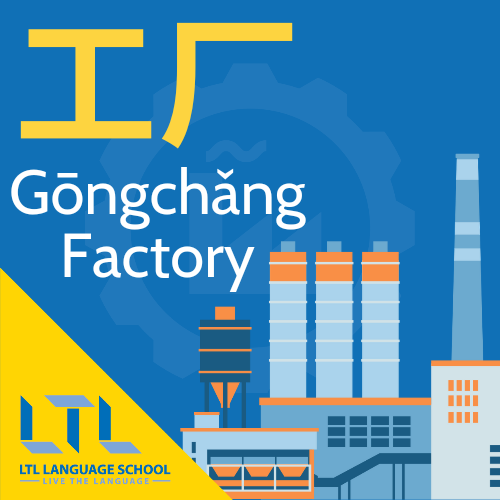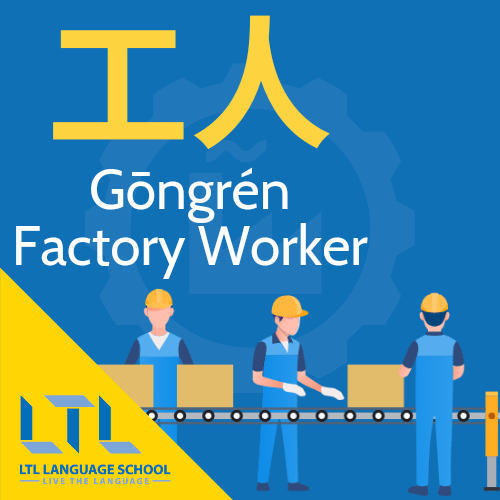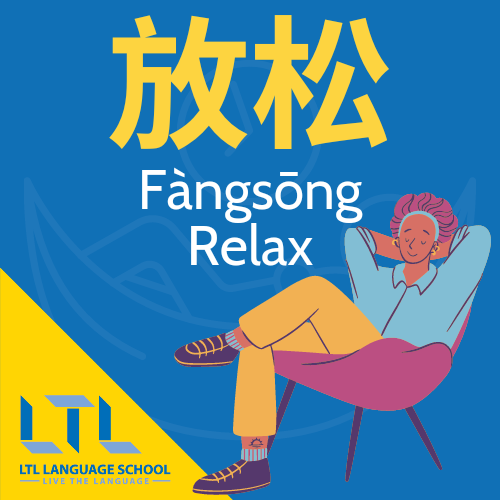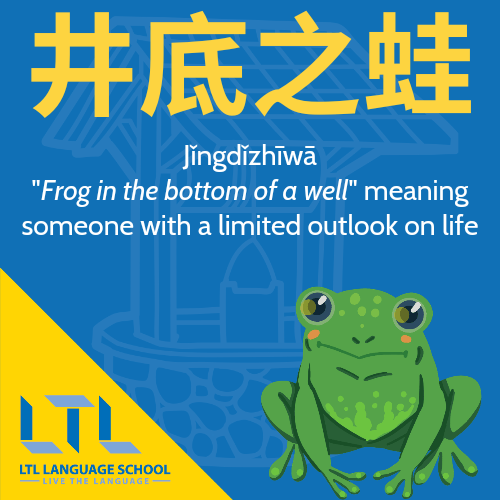Living in a Chinese Factory || My Time in a Guangdong Production Plant
How I Overcame Cultural and Linguistic Challenges of Factory Life in China + BONUS Vocabulary!
This is a guest post from LTL student and subscriber Andrea Roberto. We hope you enjoy it 😎

There is a China that is different from the shiny, fashionable skyscrapers you can find in Shanghai, or the polished and restored hutongs of Beijing.
Far even from the historical Terracotta Army and the beautiful West Lake of Hangzhou.
There is another China that lives in the shadows and that is seldom spoken or written of.
And this is what I’ll describe to you here. At least, I will provide an account of my personal experience in this sometimes-forgotten part of the country.
But first things first.
My name is Andrea, I am, among other things, a sinologist and I lived and worked in China for twelve years. In this article, I’ll be telling you about the time I spent living and working in a Guangong factory.
Living in a Chinese Factory || Total (and Intense!) Linguistic Immersion
Living in a Chinese Factory || One Hell of a Work Week
Living in a Chinese Factory || Struggling with my Surroundings
Living in a Chinese Factory || Cultural Lessons Learned
Living in a Chinese Factory || Looking Back
BONUS || Useful Vocabulary
Total (and Intense!) Linguistic Immersion
Let’s start with a big, fat culture shock!
I moved from the marvellous city of Hangzhou to a peripheral area of Guangdong, the outskirts of Dongguan, in a town called Dalang. My home was a knitting factory.

I discovered a whole new world.
I had come from more than two years in Beijing and Hangzhou, where, for better or worse, I had few contacts with the locals.
I had Chinese friends, but the expat community was always there to help me out, when I needed a rest from too much Chinese.
If you study a language abroad, you will no doubt understand what I mean.
Well, in Dalang foreigners were so few and so immersed in their daily activities that the above-mentioned solace was difficult to find. This was of course an incredible boost for my language capabilities.
I started speaking Chinese early in the morning and never stopped till the late afternoon.
I was the only Western-looking face in the whole factory, a place that amounted to at least 300 workers.
BONUS || If you would like an immersive language learning experience similar to this one – live with a Chinese host family! Check out our homestay options here.
The challenges were many.
First the different accents. Most of the workers were southerners, from Zhejiang, Jiangsu, Hunan, and of course Guangdong.
This forced me to exert extra effort to understand them, since I was used to the northern pronunciation, the one you learn as a student.
They were very nice and patient, fortunately, because my job was to translate internal communication into the language of the customers (Italian at the time) and vice versa.
So, there was really no escaping. I had to understand, and I had to speak.
Another challenge was to learn the lingo, the technical vocabulary, and some local variants of words I already knew.
FOR EXAMPLE || I knew that Cantonese is known as yuèyǔ (粤语), but in Guangdong people tend to call it báihuà (白话).

Apart from this, I had to deal with some – to me – illogical phenomena.
Let me give you an example.
Black in Mandarin is hēi (黑).
In Cantonese it is written with the same character but has a different pronunciation: hak1.
Now, 黑 is not very simple to write.
To simplify it, since during their daily work they wrote a lot by hand, they used 克 which has the same pronunciation as 黑 in Cantonese, but is pronounced kè in Mandarin.
So it happened that Mandarin speakers said kèsè (克色,” ke” colour), instead of hēisè (黑色 black colour).
Do you understand why I was sometimes at a loss? 😅
But apart from the language, the main challenges were cultural ones.
My colleagues had seen foreigners only when customers came to visit, which rarely happened.
I, on the other hand, had experienced a sweetened version of China in Beijing and Hangzhou, where people tend to be partially influenced by the West.
Even when they’re not, they have a slight idea of the so-called cultural gap.
In other words, they appear more tolerant and sometimes even explain when something is said or done in the wrong way.
Not in Dalang. I made some cultural faux pas that made me look like an uncivilized barbarian.

One very important lesson I learnt there is that you can never ever directly rebuke a colleague in China.
The concept of ‘losing face’ (丢脸) is very real and present.
It is not that you can’t point out mistakes, if there are some.
You just can’t say it directly, so that you will not make the other person appear badly.
What they tend to use is a sort of “sandwich technique”, which means start with random compliments for the person, then critique, then some more compliments.
This is not so different from what is taught in many leadership courses.
Such experiences were something of paramount importance for my later years in China.
It taught me the value of cultural differences and of pragmatism. A lesson I have been carrying with me ever since.

What is 面子 | A Guide to “Face” and Why it’s So Important in China
What is Mianzi 面子 and why is it so important? Today we take a look at an important part of Chinese culture – face.
One Hell of a Work Week!
So first of all, in Dalang I worked in a Chinese factory for a Chinese boss.
We started working at 8:30am and finished at 5:30pm, but since I was responsible for the communication with Europe, it happened quite often that I had to work extra hours because of the different time zone.

My morning was, for the same reason, usually easy.
For lunch the workers had about an hour to eat and rest (I had two).
The Chinese take their after-lunch nap quite seriously, either going back to their dorm room to sleep, or dozing off on the spot, under their desk.
The boss was no exception.
The office workers and the factory workers had different conditions.
They lived all in dorms in the factory, but the former had better lodgings (4-bed bedrooms instead of 6 or 8-bed ones).
Furthermore, the factory never stopped working, apart from the 1st day of every month.
The office on the contrary did not work on Sundays.
In some particularly intense periods of the year, the factory worked at night as well. There were no paid leaves or paid holidays. No work, no money.
This was at least the situation some years ago.
There were rumours of improvements being on their way, but I am not sure they were actually carried out (the industry changed dramatically after the introduction of automatic knitting machines, that can work 24/7).
There was compulsory time off during the Chinese New Year (January-February), Labour Day (May 1st) and the celebration of National Day (October 1st ).
But the factory had less days off than the office even during these national celebrations.
I was treated differently, with some privileges, starting from my living space.
I was also cut some slack on working hours and weekends. But living in a golden cage is still living in a cage.
Although, as you’ll see, getting out was not always so liberating as I would have liked it to be.
Struggles with my Surroundings
The factory itself was a small village, with a production building, an office building, and a dormitory building.
I had my quarters one floor upon the office. I lived in a sort of hotel room.
There were other rooms like mine, that originally served the purpose of hosting the guests, be it customers or colleagues from Europe.

The factory was so designed because, when they started their activity there was no hotel for foreigners in the area and driving customers or guest all the way from Shenzhen was impractical.
But then hotels arrived even there, and I basically had a whole floor only for myself.
Since there were no restaurants either at the beginning, the hallway of this floor ended in an enormous western-style kitchen, that was used to prepare meals for the boss, her family, and the guests.
That was my salvation!
I love Chinese food, but the quality of the restaurants outside the factory was a problem.
They were either low-level street food for a worker’s pockets, or high-end restaurants for the rich owners of the factories that needed to reciprocally show off with their guests or with the visiting customers.
As the Romans said, tertium non datur (no third option available). Hence me calling the kitchen my salvation.
BONUS || Psst… have you heard of the 8 Great Chinese Cuisines?
Now, before I start describing the surroundings and the human population I lived with, a note.
What I am going to say is strictly related to my experience, what I saw and felt, and it is meant to be as devoid of any judgement as possible.
After a brief initial indifference, I started to hate the place, and for a while I hated the people because I could not distinguish between the two.
The first thing one noticed getting out of the factory was the smell. Smell of rotten food, of air pollution. I did turn and go back in more than once, as soon as I smelled the air in particularly nasty days.
Then it was the turn of the eyes to be pricked. Anywhere one looked there were factories not different from the one I lived in, residential buildings of extremely poor taste and quality and, in general, concrete. Concrete all over the place.
There were occasional trees, but those were survivors.
Especially in the morning, after breakfast was over, every plastic bag, single-use chopstick or plastic container was discarded on the floor.
Finally, the ears. The noise of engines, people shouting, a lot of people shouting, and the unbearably high volume of the pop music that some shops shot outside, in the attempt to attract patrons, completed the picture.

Ironically one of the few places one could find peace and rest was the hall of a hotel (where for some reason Western social media worked perfectly).
There was also the Songshan Lake (松山湖) and its surrounding park.
The lake is artificial, but the park around it provided a glimpse of the luxurious nature that dominated Guangdong till not many years ago.
Somehow though, not even in the park could I find total solace. The Chinese have a keen sense of perfecting nature.
In some cases, like the gardens in Suzhou or the West Lake in Hangzhou, the result is amazing.
But in these peripheral areas, the story is not always the same unfortunately.
So, in my spare time I tended to stay at home and watch films or train Chinese martial arts.
I accumulated tons of DVDs (yes, it was some time ago, I know).
Every now and then I went back to see my friends in Beijing or to Hong Kong.

Chengdu Street Food – 5 Must-Try Street Foods in Chengdu
Street Food in Chengdu – Five Top Foods That Aren’t to Be Missed Chengdu Street Food – oh it’s good! It’s so, so good! Sichuan province is famous for its food, it is the home of the comforting hotpot, after…
Cultural Lessons Learned
You gather my impression of living in a Chinese factory city wasn’t the greatest.
The emotionally immature me that lived there blamed them for the environmental and cultural difficulties that surrounded me.
But of course, it was all on me. I mean, I was completely overwhelmed by my unmet expectations, and for a long while I could not see things as they were.

The poorly educated workers that surrounded me had no possibility to escape from there.
They did not have another place to go, and if they did, it was just another Dalang.
They had little chance to elevate themselves.
In Chinese there is a wonderful phrase to describe people with a limited outlook on the world – 井底之蛙 – which literally translates into “frog at the bottom of a well” .
They were the frogs. And they could not get out of their situation, because in most cases they did not even know there was an outside to aspire to.
But they were and are the unbelievably strong and still fragile shoulders on which the contemporary Chinese economy weighs.
And with all my blindness, I was unable to see that the cultural heritage lived on even there and then.

Chinese Proverbs: 9 of the Best Chinese Sayings // PLUS Bonus Quiz
While there are many sayings in English, Chinese proverbs are comparatively used much more frequently in everyday speech. These are called chéngyǔ 成语.
For example, in gongfu tea (功夫茶) customs.
There is a way of preparing and drinking tea, that one cannot see in the north of the country, except in particularly elegant or refined contexts.
In Guangdong almost everyone performs it with friends, relatives, customers, or simple guests multiple times a day.
I distinctly remember a guard at the entrance of a building preparing tea for some friends on the street, while roosting on the low plastic stools that you can find anywhere in China (you do not sit on them, you actually squat).
And then there was this inexplicable readiness to help, whenever a person needed it. I say inexplicable, because the urge to help others is sometimes socially forced on us, in the west. There it appeared to be a second nature.

And frankly it did not matter, whether the attempt to help me when I needed it resulted in making things worse, as it did happen sometimes.
The intention behind was pure and that was enough.
One of the ways people all over the world display hospitality is, of course, food.
Considering that in China even business is generally conducted around a table, it is no surprise that they have developed this human habit to a superior level.
This happens in the whole country, but Guangdong is special.
Cantonese food (粵菜) is by far the most refined, varied, and particular of all the Chinese local gastronomic traditions. This is a fact.
All the country knows that “Cantonese people dare eat anything” (they literally say 广东人什么都敢吃).
And this is because people in Guangdong are religious about their food.
They seldom eat food from other places with pleasure, and even other Chinese cuisines are looked down upon.
I think they might have a point, because theirs is the most complex food culture of the whole country.
On a final note, a legend I heard in Guangdong: food is such a refined art in China, that allegedly a traditional Chinese cook could slowly poison a person just with nutritionally unbalanced recipes and it would still taste great.
Looking Back
I wrote this article for two main reasons. The first is to put down a part of some important memories I do not want to lose.
The second is to do justice to a country that literally became part of me, and that as such I love.
China is an amazing experience. I can’t even call it a place because it is not, not only one at least. It changed me before I went there, it revolutionised me during and after.
I understand the appeal that places like the big cultural heritage sites have.
I stayed in Beijing and Hangzhou and loved it there.
I would still live in Hangzhou, for example. But there is a certain amount of artificiality in what you see and hear about these places.
They are often displayed, and rightly so, as the pride and joy of the country. Nothing intrinsically wrong with this.

How To Travel in China: The 7 Methods To Move
Your Complete Guide on How to Travel in China✈️ When coming to China for the first time a common question is – How to Travel in China? What’s the deal? There are numerous ways to get around China but a…
My hope is that my experience, as limited as it was, can foster a healthy interest for a continent that is often ufairly portrayed by the west. As with anything, it’s not a black and white situation.
As I said, I wanted to show the dark side of the moon, because everybody can appreciate light and perfection.
But to appreciate something despite its flaws requires balance, knowledge and love, real love.
What was your biggest culture shock when living abroad? Let us know in the comments!
BONUS Vocabulary!
Here’s plenty of vocabulary related to this article and factories for you to get your teeth into!
| Chinese characters | Pinyin | English Meaning |
|---|---|---|
| 工厂 | Gōngchǎng | Factory |
| 工人 | Gōngrén | Factory worker |
| 办公室 | Bàngōngshì | Office |
| 职工 | Zhígōng | Office worker |
| 保安 | Bǎoān | Guard (at the entrance of a building) |
| 生产 | Shēngchǎn | To produce |
| 粤语 | Yuèyǔ | Cantonese language |
| 井底之蛙 | Jǐngdǐzhīwā | Literally “frog at the bottom of a well”, indicating a person with a limited outlook on life or on a particular situation |
| 针织品 | Zhēnzhīpǐn | Knitwear product |
| 東莞(市) | Dōngguǎnshì | Dongguan (city) |
| 大朗鎮 | Dàlǎngzhèn | Dalang (town) |
| 鎮 | Zhèn | Village, town |
| 功夫茶 | Gōngfuchá | Gongfu tea |
| 單車 | Dānchē | Used in Guangdong for bicycle (instead of 自行車 zìxíngchē) |
| 蹲 dūn | Dūn | To squat |
FAQs
How do you say factory in Chinese?
In Mandarin Chinese, factory is 工厂 (prounounced gōngchǎng).
Where is Guangdong province?
Guangdong is located in the south of China. To see the location of all 34 provinces in China, check out our beginner’s guide here.
Are Mandarin and Cantonese the same language?
Whilst Mandarin and Cantonese use the same written characters, they are mutually unintelligible languages as they are spoken differently.
Here’s our Top 7 Differences between Mandarin and Cantonese!
What’s the best way to learn Chinese?
The best way to learn Chinese is the way that works for you!
Whether that’s online language lessons, in-person classes or a homestay experience, LTL can help you find your path to fluency.
Want more from LTL?
If you wish to hear more from LTL Mandarin School why not join our mailing list? We give plenty of handy information on learning Chinese, useful apps to learn the language and everything going on at our LTL schools!
Sign up below and become part of our ever-growing community!
BONUS || Want to study Chinese with us in Chengdu? Why not check out our group courses or individual Chinese classes.

 Hi, my name is Sabatino. I am from Italy and I am a Student Advisor at LTL. Fancy coming to study with us in China?
Hi, my name is Sabatino. I am from Italy and I am a Student Advisor at LTL. Fancy coming to study with us in China? Hi, my name is Mojca. I am from Slovenia in Europe and I work as a student advisor at our Chengdu school.
Hi, my name is Mojca. I am from Slovenia in Europe and I work as a student advisor at our Chengdu school.

